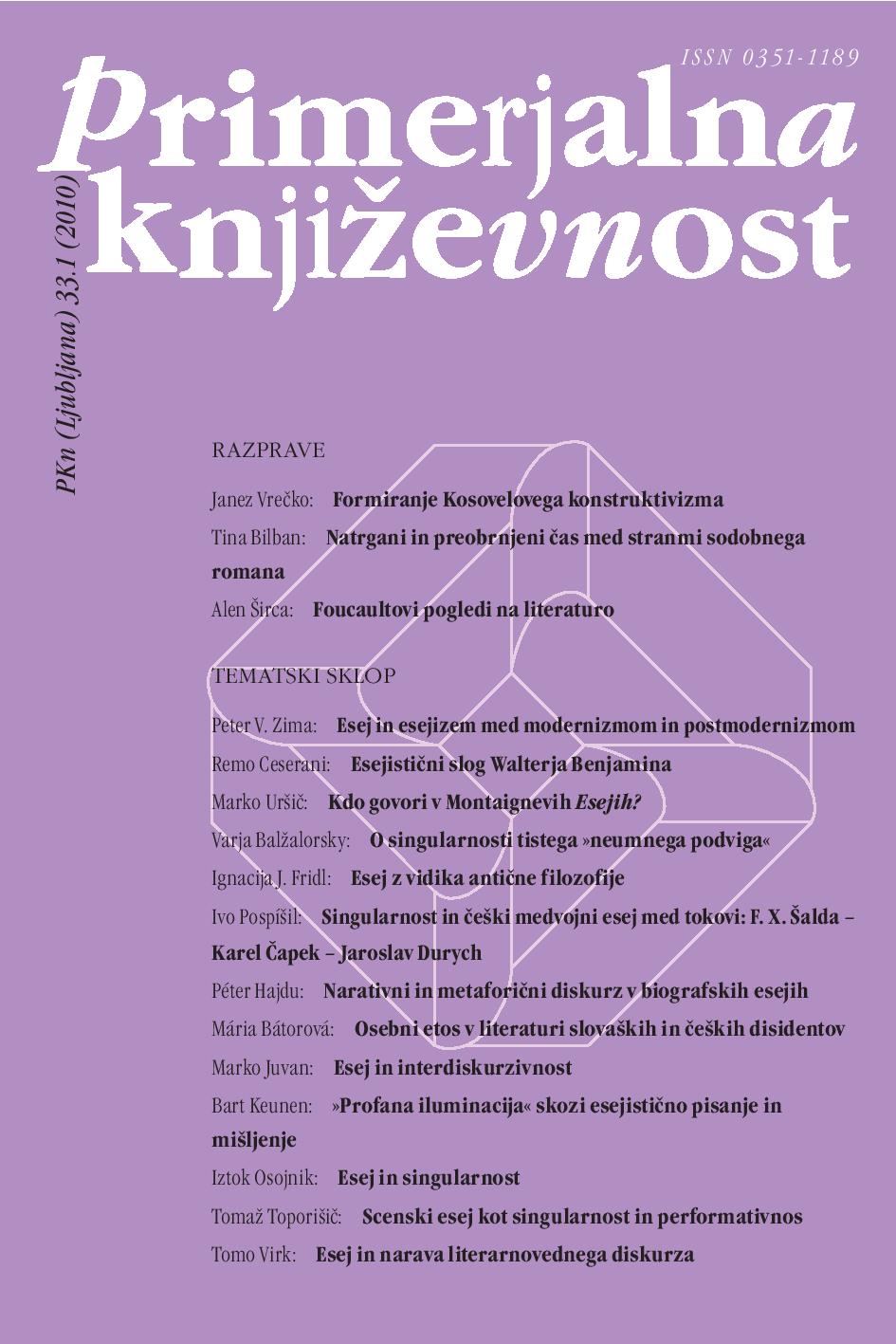Foucault’s Views on Literature
Keywords:
literature and philosophy, Foucault, Michel, structuralism, fictionality, authorshipAbstract
This article discusses the conceptions of literature by the famous French theoretician Michel Foucault. As already implied in the title, Foucault liked to change his views on literature. This basically involved two opposing viewpoints. In Focault’s early works, literature (or, more specifically, modern literature) was at the forefront of his interest, especially because he believed it has a strong liberation potential. However, in his later works this was quite the opposite: literature was perceived merely as a social and political game played by the modern bourgeoisie. Focault’s early works express a positive attitude towards literature and can be divided into four topics: madness or the mad language of poetry, transgression, notions of exteriority, and literary fiction. According to Foucault, until the end of the eighteenth century literature always reflected a non-problematic image of the world and thus served the ruling ideology. Only with the emergence of Romanticism, and finally with symbolism, did literature manage to cut its ties with the communicational function of language and penetrate the field of mad (i.e., uncontrolled and polyvalent) language. Since then literature, especially in the completion of modern literature (which according to Foucault already began at the beginning of the nineteenth century) in modernism, has also been transgressive; this means it constantly moves on the edge of language, without ever crossing over into the field of transcendence. In the sense of (post)structuralism, which was emerging at that time, Foucault claims that writing (écriture) is primary and comes before any subject; literature thus involves thinking that comes from the “outside” (exteriority), although this exteriority is never merely a counterweight to the interior. – In Foucault’s late works (i.e., as part of his genealogy of authoritative discourses), literature is no longer specially thematized. Nonetheless, by the late 1960s it was possible to almost perceive some sort of an anti-literary turn; for example, in his famous essay “What is an Author?” In a 1970s interview, Foucault stated that for him literature had become a bourgeois institution in which transgression was no longer possible. From then on, literature had to be viewed within the context of the discourses of power. Foucault did not carry out this project himself; instead, this work was performed by various cultural and materialist currents of contemporary literary studies.References
Agamben, Giorgio. Che cos’è un dispositivo? Rim: Nottetempo, 2006.
Barthes, Roland. »Smrt avtorja.« Sodobna literarna teorija. Zbornik. Ur. Aleš Pogačnik. Ljubljana: Krtina, 1995. 19–23.
de Certeau, Michel. »Le noire soleil du langage : Michel Foucault.« Histoire et psychanalyse entre science et fiction. Pariz: Gallimard, 2002. 152–173.
Deleuze, Gilles. Foucault. Pariz: Les Éditions de Minuits, 1986.
Dolar, Mladen: »Spremna beseda.« Vednost – oblast – subjekt. Michel Foucault. Ljubljana: Krt, 1991. vii–xxxv.
Dreyfus, Hubert L. in Rabinow, Paul. Michel Foucault: Beyond Structuralism and Hermeneutics. Second Edition, With an Afterword by and Interview with Michel Foucault. Chicago: The University of Chicago Press, 1983.
During, Simon. Foucault and Literature. Towards a Genealogy of Writing. London in New York: Routledge, 1992.
Foucault, Michel. Dits et écrits I: 1954–1975. Pariz: Gallimard, 2001.
– – –. Dits et écrits II: 1976–1988. Pariz: Gallimard, 2001.
– – –. »Kaj je avtor?« Sodobna literarna teorija. Zbornik. Ur. Aleš Pogačnik. Ljubljana: Krtina, 1995. 25–40.
– – –. Les mots et les choses : une archéologie des sciences humaines. Pariz: Gallimard, 1966.
– – –. To ni pipa. Prev. Uroš Grilc in Ana Žerjav. Ljubljana: Društvo za teoretsko psihoanalizo, 2007. 9–42.
– – –. Vednost – oblast – subjekt. Izbr. in ur. Mladen Dolar. Prev. Boris Čibej et al. Ljubljana: Krt, 1991.
– – –. Zgodovina norosti v času klasicizma. Prev. Zdenka Erbežnik. Ljubljana: *cf., 1998.
– – –. Zgodovina seksualnosti. 2, Uporaba ugodij. Prev. Brane Mozetič. Ljubljana: ŠKUC, 1998. (Lamda 11).
– – –. Zgodovina seksualnosti. 3, Skrb zase. Prev. Brane Mozetič. Ljubljana: ŠKUC, 1993. (Lambda 2).
– – –. Življenje in prakse svobode. Izbrani spisi. Izbr. in ur. Jelica Šumič Riha. Prev. Jelka Kernev Štrajn et al. Ljubljana: ZRC SAZU, 2007.
Frank, Manfred. »Zum Diskursbegriff bei Foucault.« Diskurstheorien und Literaturwissenschaft. Ur. Jürgen Fohrmann in Harro Müller. Frankfurt ob Majni: Suhrkamp, 1988. 25–44.
Freundlieb, Dieter. »Foucault and the Study of Literature.« Poetics Today 16.2 (1995): 301–344.
Geisenhanslüke, Achim. Einführung in die Literaturtheorie. Von der Hermeneutik zur Medienwissenschaft. 4. pregl. izd. Darmstadt: Wissenschaftliche Buchgesellschaft, 2007. (Einführungen Germanistik).
Lešnik, Bogdan. »Fragmenti o norosti, seksualnosti in sebi.« Zgodovina norosti v času klasicizma. Michel Foucault. Prev. Zdenka Erbežnik. Ljubljana: *cf., 1998. 249–281.
Matajc, Vanesa. »Novi historizem: kompleksna interakcija v poetiki kulture.« Literatura 17 (2005): 81–108.
Močnik, Rastko. »Spremna beseda.« Nadzorovanje in kaznovanje. Michel Foucault. Ljubljana: Delavska enotnost, 1984. 307–324.
O’Leary, Timothy. »Foucault’s Turn from Literature.« Continental Philosophy Review 41 (2008): 89–110.
Revel, Judith. Le vocaublaire de Foucault. Pariz: Ellipses Édition, 2002.
Virk, Tomo. Duhovna zgodovina. Ljubljana: DZS, 1989. (Literarni leksikon 35).


